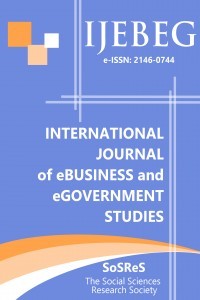SUGGESTING A FRAMEWORK FOR TRANSITION TOWARDS MORE INTEROPERABLE E-GOVERNMENT IN TURKEY: A NAUTILUS MODEL OF CROSS-CULTURAL KNOWLEDGE CREATION AND ORGANIZATIONAL LEARNING
SUGGESTING A FRAMEWORK FOR TRANSITION TOWARDS MORE INTEROPERABLE E-GOVERNMENT IN TURKEY: A NAUTILUS MODEL OF CROSS-CULTURAL KNOWLEDGE CREATION AND ORGANIZATIONAL LEARNING
As an important project for Turkey to achieve the Information/Knowledge Society Strategic Goals, the e-Government Gateway currently focuses on the delivery of the public services via a single portal on the Internet, underlying a transition towards more integrated systems and interoperable operations. In order to provide a supportive base for this transition we develop a modeling of “nautilus” model of cross-cultural knowledge creation and organizational learning, and link this conceptual model with the e-Government Gateway. Based on Knowledge Science concepts such as ba (place), ma (time), reflection and refraction, nautilus model incorporates the interactions @ the Internet and mobile devices that contribute to cross-cultural information transfer and knowledge creation. We hope the resulting work will contribute to the improvement of e-government services not only in Turkey but all around the world
Keywords:
E-Government Gateway Project in Turkey Reflection-Refraction, Ba-Ma, EMMA and ECUI spirals, nautilus model of cross-cultural knowledge creation and organizational learning,
___
- Adler, N. J. (2002) International Dimensions of Organization Behavior, South-Western,
- Akta+, Z. (1987) Structured Analysis and Design of Information Systems, Prentice-Hall, USA.
- Berque, A, (1982) Vivre L’espace au Japon. Presses Universitaires de France, Kukan no
- Nihonbunka, translated by Makoto Miyahara (1994), Tokyo: Chikuma Shobo (in Japanese).
- DPT (2008) Bilgi Toplumu Stratejisi ve Eylem Plan: 1. De
- Drucker, P.F. & Maciariello, J.A., (2004). The Daily Drucker, Harper Business
- Hayashi, T. (2004). “Captured Nature and Japanese Way of Tolerance” in MAJA Estonian
- Architectural Review Holden, N.J. (2002) Cross-Cultural Management: A Knowledge Management Perspective, Financial Times
- Kerkhove, D. D. (2003). NextD Journal: ReRethinking Design Issue Two, Conversation 2.3 http://www.nextd.org/02/pdf_download/NextD_2_3.pdf
- Medeni, T., Elwell, M., & Cook, S. (2007) “Immersing ‘Digitally Deaf” into Games for
- Learning: Towards a Theory of Reflective and Refractive Space-Time for Knowledge Management” BEYKON 2007, Turkey
- Medeni, T ., Iwatsuki, S., & Cook, S. (2008) “Reflective Ba and Refractive Ma in Cross
- Cultural Learning” Eds. Putnik, G. D. and Cunha, M. M. Encyclopedia of Networked and Virtual Organizations, Idea Group References Moon, J. (2004). A Handbook of Reflective and Experiential Learning: Theory and Practice. London: RoutledgeFalmer
- Nonaka, I & Takeuchi, H. (1995) The Knowledge-creating Company: How Japanese
- Companies Create the Dynamics of Innovation. Oxford: Oxford University Press. Nonaka, I., Toyama, R., & Scharmer, O. (2001) Building Ba to Enhance Knowledge
- Creation and Innovation at Large Firms. http://www.dialogonleadership.org/Nonaka_et_al.html - OECD (2006) OECD e-Government Studies: Turkey OECD
- Tihon, A. (2006) The Informational Attractors: A Different Approach of Information and Knowledge Management
- Umemoto, K. (2004) “Practicing and Researching Knowledge Management at JAIST”
- Technology Creation Based on Knowledge Science: Theory and Practice JAIST Forum, Japan United Nations (2008) E-Government Survey 2008 - From E-Government to Connected Governance UN
- Uno, Y. (1999) “Why the Concept of Trans-Cultural Refraction Necessary” NEWSLETTER:
- Intercultural Communication No. 35 November, 1999
- Wankel, C. & DeFillippi, R. (2006) New Visions of Graduate Management Education.
- Connecticut: Information Age Publishing.
- Başlangıç: 2009
- Yayıncı: Sosyal Bilimler Araştırmaları Derneği
